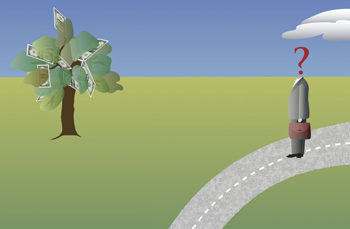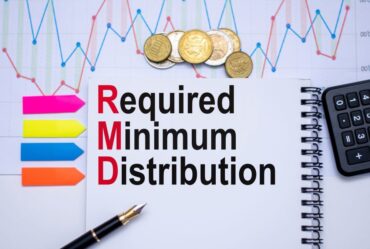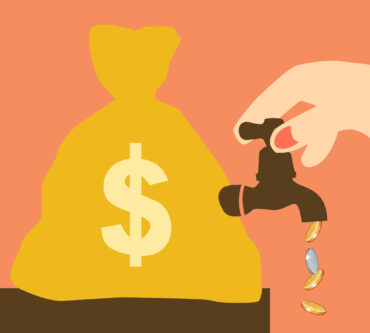Q1. SHOULD I INVEST NOW OR WAIT UNTIL THE STOCK MARKET IMPROVES?
A. Now. Nobody can tell you when the stock market will improve, but when it does, you will have missed all of the gains, and you will be buying high.
Instead, if your risk tolerance allows for it, buying stocks during a recession can add much greater wealth. Rather than selling your stocks after they are 30% down (locking in a 30% loss!), buying stocks during this time, while difficult, actually means you are buying low.
Now, with stock investing, you have to be patient. Corrections can take a couple of years to work themselves out. However, if you look back through each market crash, we always believe that there is no way we can get out, but when we do, instead we ask ourselves, “how did we ever react so poorly?”
The point is that assuming you have the risk tolerance to invest in stocks, you are better off investing and leaving it in the market. You are worse off when you try to wait and time the market. See Fidelity’s article on missing days in the market, and how missing the best 5 days,. to missing the best 50 days impacts your overall return.
Q2. SHOULD I REFINANCE MY STUDENT LOANS?
A. Hmmm…Maybe.
Refinancing your student loans could potentially save you thousands of dollars! But is a student loan refinance the right move for you right now? That’s actually a trickier question than you’d think.
Refinancing only makes sense if you can get a lower interest rate now than when you first accepted the loans. To get a better interest rate, you need to have better credit and higher income now than you did back them. You also need to know what the national interest rates have been doing.
Your interest rates will depend on your credit and income, but it would be exceptionally difficult to get a better rate from a refinance if the current available rates are higher than the rates on your existing loans.
You also need to consider any federal protection you might accidentally waive by refinancing.
In some cases, there are government programs for student loan forgiveness (like for some teachers and public servants). This isn’t usually the case, but it is something you should look into to make sure you’re not waiving rights that could benefit you more than the refinance.
Q3. SHOULD I REFINANCE MY MORTGAGE NOW?
A. Another…Maybe.
The time to refinance is when you want to make a less-than-desirable mortgage better with a new interest rate.
Do a break-even analysis to see if refinancing is something worth doing in your situation. A break-even analysis means running the numbers on whether you’ll be in your home long enough to benefit from the savings that a lower interest rate and payment could bring.
Then you should work out how long it’ll take you to make up the closing costs you’ll have to pay for your refinanced mortgage. Yes, there will be closing costs—we’ll get to them soon!
In general, refinancing makes the most sense if you fall into one of these categories:
1. You Have An Adjustable Rate Mortgage (ARM)
With your ARM having interest rates that are adjustable, you might start off with the first few years at a fixed rate. But after that, the rate can adjust based on multiple factors like the mortgage market, LIBOR market index, and the rate at which banks themselves lend each other money. Bottom line is ARMs transfer the risk of rising interest rates to you—the homeowner.
So, in the long run, an ARM can cost you an arm and a leg! (Yes, we went there.) That’s when refinancing into a fixed-rate mortgage could be a good financial move. It’s worth it to avoid the risk of your payments going up when the rate adjusts.
2. The Length Of Your Mortgage Is Over 15 Years
If your original mortgage is a 30-year term (or more), then refinancing is a good way to get to the ultimate goal of locking in a 15-year fixed-rate mortgage—ideally with a new payment that’s no more than 25% of your take-home pay.
But if your interest rate is low enough on a 30-year fixed-rate mortgage to compete with the 15-year rates out there, make sure refinancing just to get the shorter term isn’t going to cost you more. You’re better off making extra payments (and are committed to making them) on your 30-year mortgage every month to shorten your payment schedule.
Simply put, you want to own your home as soon as possible instead of your home-owning you! Use our mortgage payoff calculator to run your numbers and see what your monthly payment would be on a 15-year loan.
3. You Have a High-Interest Rate Loan
If your mortgage has a higher interest rate compared to ones in the current market, then refinancing could be a smart financial move if it lowers your interest rate or shortens your payment schedule.
If you can find a loan that offers a reduction of 1–2% in its interest rate, you should consider it. Remember to factor in your break-even analysis too! Refinance only if you’re planning to stay in your home for a long time because it will give you time to make up those closing costs.
Q4. SHOULD I BUY OR LEASE A CAR?
A. Buy!
Leasing is tempting because the monthly payments are usually lower, and you usually don’t need as large a down payment with a lease as with a purchase.
But there are a few big problems with leasing:
1. IF YOU DRIVE A LOT, IT’LL COST YOU.
Lease agreements allow you to drive a certain number of miles per year (often 10,000 or 15,000 depending on the lease agreement). If you go over that number, you pay a small fee for every additional mile. That fee is somewhere between 10 and 20 cents, but again, it’s for every mile over your lease limit. And it adds up quick!
2. IF YOU DAMAGE THE CAR, IT’LL COST YOU.
If you park on the street or in a tight-space lot where your car is prone to mystery dings, you’ll have to pay for that damage when you lease expires. Have kids or pets? If they make a mess of the interior, you’ll also be paying for that.
3. IF YOU TERMINATE THE LEASE EARLY, IT’LL COST YOU.
If you need to terminate the lease before it expires for any reason, you can expect to be heavily penalized. The fee could be as much as 6 months’ worth of lease payments. Yikes!
4. AT THE END OF THE LEASE, YOU HAVE NOTHING.
Here’s the real reason we recommend buying over leasing: when you buy, you own the car free and clear once all your payments have been made. That gives you options. You can continue driving it for years payment-free! Or you can sell it to provide the down payment for your next vehicle.
When you lease, on the other hand, you have nothing at the end of your lease. You would need to start the process all over again, coming up with a fresh down payment for a new lease.





